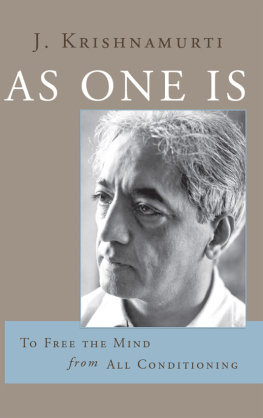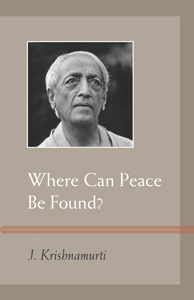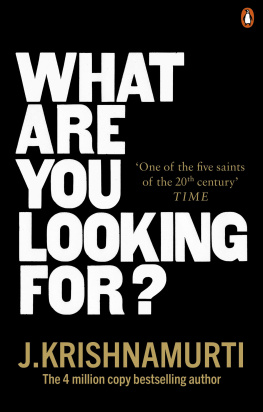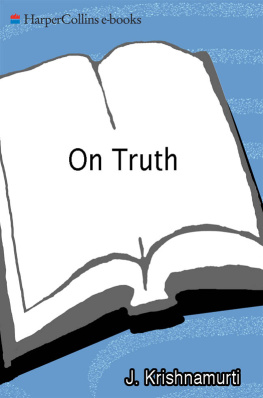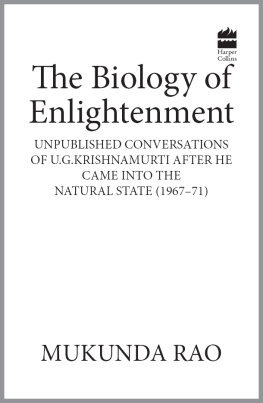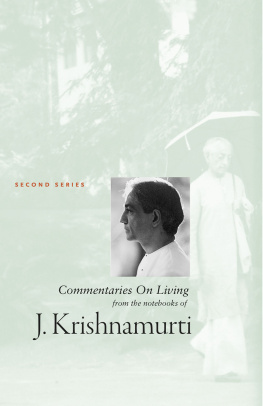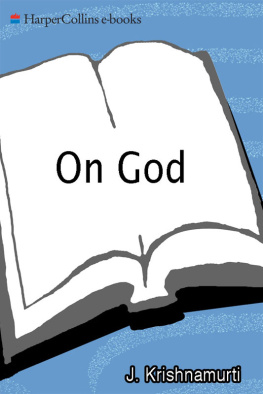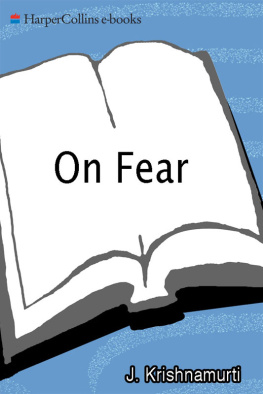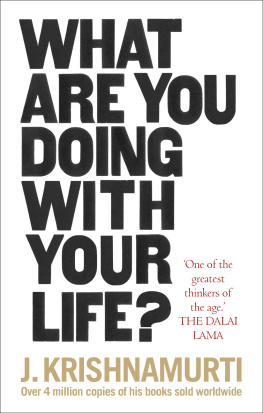First Talk in the Oak Grove
August 6, 1955
T hroughout the world we have many grave problems, and even though welfare states may be created, and the politicians may bring about a superficial peace of coexistencewith economic prosperity in a country of this kind where there is booming production and the promise of a happy futureI do not think that our problems can so easily be solved. We want these problems to be solved, and we look to others to solve themto religious teachers, to analysts, to leadersor else we rely on tradition, or we turn to various books, philosophies. And I presume that is why you are hereto be told what to do. Or you hope that through listening to explanations, you will comprehend the problems that each one of us is confronted with. But I think you will be making a grave mistake if you expect that by casually listening to one or two talks, without paying much attention, you will be guided to the comprehension of our many problems. It is not at all my intention merely to explain verbally or intellectually the problems that we are confronted with; on the contrary, what we shall attempt to do during these talks is to go much deeper into the fundamental issue which makes all these problems so complicated, so infinitely painful and sorrowful.
Please have the patience to listen without being carried away by words, or objecting to one or two phrases or ideas. One must have immense patience to find out what is true. Most of us are impatient to get on, to find a result, to achieve a success, a goal, a certain state of happiness, or to experience something to which the mind can cling. But what is needed, I think, is a patience and a perseverance to seek without an end. Most of us are seeking; that is why we are here, but in our search we want to find something, a result, a goal, a state of being in which we can be happy, peaceful; so our search is already determined, is it not? When we seek, we are seeking something which we want, so our search is already established, predetermined, and therefore it is no longer a search. I think it is very important to understand this. When the mind seeks a particular state, a solution to a problem, when it seeks God, truth, or desires a certain experience, whether mystical or any other kind, it has already conceived what it wants; and because it has already conceived, formulated, what it is seeking, its search is infinitely futile. And it is one of the most difficult things to free the mind from this desire to find a result.
It seems to me that our many problems cannot be solved except through a fundamental revolution of the mind, for such a revolution alone can bring about the realization of that which is truth. Therefore, it is important to understand the operation of ones own mind, not self-analytically or introspectively, but by being aware of its total process; and that is what I would like to discuss during these talks. If we do not see ourselves as we are, if we do not understand the thinkerthe entity that seeks, that is perpetually asking, demanding, questioning, trying to find out, the entity that is creating the problem, the I, the self, the egothen our thought, our search, will have no meaning. As long as ones instrument of thinking is not clear, is perverted, conditioned, whatever one thinks is bound to be limited, narrow.
So our problem is how to free the mind from all conditioning, not how to condition it better. Do you understand? Most of us are seeking a better conditioning. The communists, the Catholics, the Protestants, and the various other sects throughout the world, including the Hindus and Buddhists, are all seeking to condition the mind according to a nobler, a more virtuous, unselfish, or religious pattern. Everyone throughout the world, surely, is trying to condition the mind in a better way, and there is never a question of freeing the mind from all conditioning. But it seems to me that until the mind is free from all conditioning, that is, as long as it is conditioned as a Christian, a Buddhist, a Hindu, a communist, or whatnot, there must be problems.
Surely, it is possible to find out what is real, or if there is such a thing as God, only when the mind is free from all conditioning. The mere occupation of a conditioned mind with God, with truth, with love, has really no meaning at all, for such a mind can function only within the field of its conditioning. The communist who does not believe in God thinks in one way, and the man who believes in God, who is occupied with a dogma, thinks in another way; but the minds of both are conditioned; therefore, neither can think freely, and all their protestations, their theories and beliefs have very little meaning. So religion is not a matter of going to church, of having certain beliefs and dogmas. Religion may be something entirely different; it may be the total freeing of the mind from all this vast tradition of centuries, for it is only a free mind that can find truth, reality, that which is beyond the projections of the mind.
This is not a particular theory of mine, as we can see from what is happening in the world. The communists want to settle the problems of life in one way, the Hindus in another, and the Christians in still another; so their minds are conditioned. Your mind is conditioned as a Christian, whether you will acknowledge it or not. You may superficially break away from the tradition of Christianity, but the deep layers of the unconscious are full of that tradition; they are conditioned by centuries of education according to a particular pattern; and surely, a mind that would find something beyond, if there is such a thing, must first be free of all conditioning.
So during these talks we are not discussing self-improvement in any way, nor are we concerned with the improvement of the pattern; we are not seeking to condition the mind in a nobler pattern, nor in a pattern of wider social significance. On the contrary, we are trying to find out how to free the mind, the total consciousness, from all conditioning, for unless that happens, there can be no experiencing of reality. You may talk about reality, you may read innumerable volumes about it, read all the sacred books of the East and of the West, but until the mind is aware of its own process, until it sees itself functioning in a particular pattern and is able to be free from that conditioning, obviously all search is in vain.
So it seems to me of the greatest importance to begin with ourselves, to be aware of our own conditioning. And how extraordinarily difficult it is to know that one is conditioned! Superficially, on the upper levels of the mind, we may be aware that we are conditioned; we may break away from one pattern and take on another, give up Christianity and become a communist, leave Catholicism and join some other equally tyrannical group, thinking that we are evolving, growing towards reality. On the contrary, it is merely an exchange of prisons.
And yet that is what most of us wantto find a secure place in our ways of thinking. We want to pursue a set pattern and be undisturbed in our thoughts, in our actions. But it is only the mind that is capable of patiently observing its own conditioning and being free from its conditioningit is only such a mind that is able to have a revolution, a radical transformation, and thereby to discover that which is infinitely beyond the mind, beyond all our desires, our vanities and pursuits. Without self-knowledge, without knowing oneself as one isnot as one would like to be, which is merely an illusion, an idealistic escapewithout knowing the ways of ones thinking, all ones motives, ones thoughts, ones innumerable responses, it is not possible to understand and go beyond this whole process of thinking.
You have taken a lot of trouble to come here on a hot evening to listen to the talk. And I wonder if you do listen at all. What is listening? I think it is important to go into it a little, if you do not mind. Do you really listen, or are you interpreting what is being said in terms of your own understanding? Are you capable of listening to anybody? Or is it that in the process of listening, various thoughts, opinions, arise so that your own knowledge and experience intervene between what is being said and your comprehension of it?

